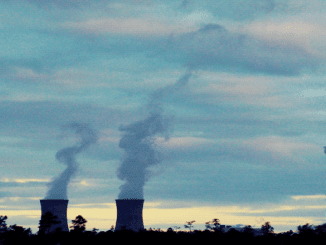
NEW YORK, New York, January 27, 2021 (ENS) – “Urgent climate action has broad support amongst people around the globe, across nationalities, age, gender and education levels,” declared United Nations Development Programme Administrator Achim Steiner today as he released the results of the first Peoples’ Climate Vote. With 1.2 million respondents, this is the largest survey of public opinion on climate change ever conducted.
Using a new and unconventional approach to polling, the survey results span 50 countries covering 56 percent of the world’s population. The poll includes over half a million people under the age of 18, a key constituency on climate change that is typically unable to vote yet in regular elections.
Poll questions were distributed through advertisements in mobile game apps in 17 languages, which resulted in a huge, unique, and random sample of people of all genders, ages, and educational backgrounds.

Steiner said, “The poll reveals how people want their policymakers to tackle the crisis. From climate-friendly farming to protecting nature and investing in a green recovery from COVID-19, the survey brings the voice of the people to the forefront of the climate debate. It signals ways in which countries can move forward with public support as we work together to tackle this enormous challenge.”
This year of 2021 is pivotal for countries’ climate action commitments, with a key round of negotiations set to take place at the UN Climate Summit, COP26, in November in Glasgow, Scotland.
The aim of the Peoples’ Climate Vote is to connect the public to policymakers and to provide them with reliable information on whether people consider climate change to be an emergency, and how they would like their countries to respond.
These perspectives are needed now more than ever as nearly 200 countries are in the process of developing new national climate pledges under the Paris Agreement, said the UNDP, which has the largest portfolio in the UN system on climate change.
UNDP, through its Climate Promise, supports 115 countries to enhance their climate change pledges under the Paris Agreement.
The Peoples’ Climate Vote respondents were asked if climate change is a global emergency and whether they support 18 key climate policies across six action areas: economy, energy, food and farms, nature, protecting people and transport.
The survey shows a direct link between a person’s level of education and their desire for climate action. There was very high recognition of the climate emergency among those who had attended university or college in all countries, from lower-income countries such as Bhutan (82 percent) and the Democratic Republic of the Congo (82 percent) to wealthy countries like France (87 percent) and Japan (82 percent).
When it comes to age, people under 18 were more likely to say climate change is an emergency than older people. Still, other age groups were not far behind, with 65 percent of those aged 18-35, 66 percent of people aged 36-59, and 58 percent of those over 60 years of age, illustrating how widely held this view is today.
An Overview of the United States Poll Results
– Belief in climate change as a global emergency was fairly high in the USA (65 percent), the same level as in Algeria and Russia.
– Women and girls in the USA were 11 percent more likely to say climate change is an emergency, which was the second-largest gender disparity behind the 12 percent difference in neighboring Canada.
– In the USA, young people (under 18) were also much more likely (75 percent) to believe climate change is an emergency than other age groups, but a majority (61 percent) of older people (over 60) still agreed with them. Globally these figures were 69 percent and 58 percent respectively.
– In the survey, there are poll results for public support for key climate policies across six sectors – energy, economy, transportation, farms and food, protecting people, and nature. The top five most popular were:

71 percent support keeping the ocean and waterways healthy – vs 45 percent on average across 50 countries
69 percent want to conserve forests and land – vs. 54 percent
65 percent support use of solar, wind and renewable power – vs. 53 percent
61 percent would build infrastructure and conserve nature to protect lives and livelihoods – vs 45 percent
61 percent want to reduce food waste – vs. 43 percent on average across 50 countries
The results were collated and processed by analysts at the University of Oxford Department of Sociology, who weighted the data to create representative estimates of public opinion. With such a large sample size and rich socio-demographic information, the margin of error of the results is low, on average +/- 2 percent.
Responses were analyzed across country groups: high income, middle income, Least Developed Countries, and Small Island Developing States, regions, gender, age, and education levels, as well as country-by-country poll results.
Detailed results broken down by age, gender, and education level will be shared with governments around the world. In many participating countries, says the UNDP, this is the first time that large-scale polling of public opinion has ever been conducted on the topic of climate change.
Professor Stephen Fisher, Department of Sociology, University of Oxford, said, “The survey – the biggest ever survey of public opinion on climate change – has shown us that mobile gaming networks can not only reach a lot of people, they can engage different kinds of people in a diverse group of countries.”
“The Peoples’ Climate Vote has delivered a treasure trove of data on public opinion that we’ve never seen before,” Fisher said. “Recognition of the climate emergency is much more widespread than previously thought. We’ve also found that most people clearly want a strong and wide-ranging policy response.”
What People Really Want
Results show that people often want broad climate policies beyond the current state of play, the survey found. Respondents tend to support what they, themselves, need, like clean air. In the poll, nine out of 10 of the countries with the most urbanized populations backed more use of clean electric cars and buses or bicycles.
Majorities backed more renewable energy in eight of the 10 surveyed countries with the highest emissions from the power sector.
Majority support for conserving forests and land was expressed in four out of the five countries with the highest emissions from land-use change, and enough data on policy preferences, the poll shows.

Four climate policies emerged as the most popular globally:
1. Conservation of forests and land (54 percent public support);
2. Solar, wind and renewable power (53 percent);
3. Climate-friendly farming techniques (52 percent); and
4. Investing more in green businesses and jobs (50 percent)
In other results:
There is majority support in nearly all G20 countries polled for more investment in green businesses and jobs.
Making companies pay for pollution had high support in seven of 12 high-income countries, led by the United Kingdom (72 percent) and Canada (69 percent).
Infrastructure to protect people from extreme weather events was the seventh most popular climate policy across all countries. Support for early warning systems was at roughly the same level.
The largest difference in the level of support between two countries for a climate policy in the survey was keeping the ocean and waterways healthy. Support for this policy was 81 percent in the United Kingdom, compared with 29 percent in Iraq, a huge difference of 52 percentage points.
This highlighted the importance of nation-specific factors – here, being surrounded by water versus almost land-locked – in guiding public opinion on some policies.
To view the entire survey, click here.
–ENS Staff
Copyright Environment News Service (ENS) 2021. All rights reserved.
© 2021, Environment News Service. All rights reserved. Content may be quoted only with proper attribution and a direct link to the original article. Full reproduction is prohibited.



